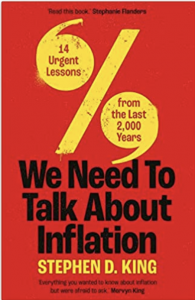I was in my teens, growing up in a Lancashire mill town, the last time stubbornly high inflation was a thing. It was a scarring experience. My parents’ wages certainly did not keep up. Rocketing food prices gave my mum sleepless nights, so she stocked up whenever something like sugar or tea bags was on special offer. We all became obsessed with switching off lights and turning down heating. Our kind of family was significantly affected – small savings in the bank, no labour market power.
So Stephen King’s We Need To Talk About Inflation: 14 Urgent Lessons From the Last 2,000 Years spoke to me. It also proved prescient, having been written before it was apparent how stubborn the current bout of inflation is proving to be – one of the messages of the book is how hard it is to squeeze inflation out of the macroeconomy. The book takes the historical (and broadly chronological) perspective that will be familiar to readers of Stephen’s previous books, and is a pleasure to read. Not surprisingly, the 1970s chapter was particularly interesting to me. As he comments at the end of this chapter, “Inflation ultimately undermines the fabric of society.” It is profoundly unfair. Yet policymakers persist in trying to tell people who can’t afford food and heat to show wage restraint – they did it then and have tried again now.
There’s also an excellent chapter on what works and what doesn’t in terms of policy responses, given how hard the task is. Price and wage controls generally don’t, albeit with exceptions to address egregious unfairness, although they are easy for policymakers to propose. A clear monetary policy framework with rules that are visibly followed does work, and in particular monetary financing of budget deficits must be ruled out. The takeaway message is that some nasty medicine is unavoidable, but it can work – if somebody will administer it. While Milton Friedman insisted inflation was a monetary phenomenon, this book concludes that it’s ultimately a political one: who will bear how much economic pain and when?

